7 Things That INFPs Experience As Children
What is it like being in the mind of an INFP child? What unique struggles and joys do they tend to experience? Let’s take a look!
Not sure what your child’s personality type is? Take our new online questionnaire here.
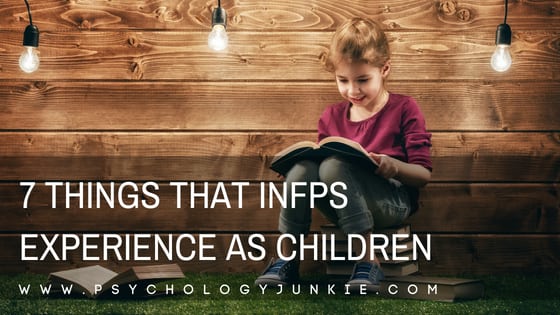
Table of contents
Estimated reading time: 6 minutes
7 Things That INFPs Experience As Children
#1 – A Deep Awareness of The Emotions Around Them
INFPs are highly in tune with their own emotions, and also the emotional safety and tension of the environment. They have sensitive antennae for conflict and strain in the atmosphere and will do what they can to avoid it or heal it. They care deeply for their loved ones and will experience great inner turmoil if their home is a place of conflict.
#2 – A Rich Imagination
INFPs are extremely imaginative and idealistic. As children, they often make up fantasy stories in their heads and enjoy daydreaming about the future and all its possibilities. While other children might want constant stimulation, young INFPs can be entertained with their lush, visionary ideas. Unfortunately, some INFP children are dissuaded in their imagination and this can lead to devastating results.
“(INFPs) live a fantasy-filled childhood, which sadly, is discouraged or even punished by many parents. With parents who require them to be sociable and industrious in concrete ways, and also with down-to-earth siblings who conform to these parental expectations, Healers (INFPs) come to see themselves as ugly ducklings…Wishing to please their parents and siblings, but not knowing quite how to do it, they try to hide their differences, believing they are bad to be so fanciful.”
– David Keirsey, Please Understand Me
#3 – Deep, Intense Emotions
The first mental process that INFPs develop is called Introverted Feeling, or “Fi” for short. This function is all about processing one’s own values, emotions, and gut feelings and understanding what is important and what it all means. INFPs are sensitive, gentle children and feel things very deeply. Insults, harsh words, neglect or rejection all hit them harder than many other types because they take it so seriously and feel it so deeply. They may appear quiet and easy-going on the outside, but many INFPs feel much more intensely on the inside than people realize. They won’t usually open up about their feelings unless a great deal of trust has been established.
#4 – A Love For Misfits
INFPs tend to feel like misfits growing up; after all, they only make up 4.4% of the US population. They have a heart for the misunderstood, rejected, or lost people (and animals) of the world. They are the kinds of children who will pick out the ugliest, most abused animal the animal shelter and call it theirs. They have a driving desire to protect anyone who seems left out or marginalized and this follows them throughout life and tends to inspire many of the causes they fight for or defend.
#5 – Uneasiness in the Physical World
INFPs tend to live in their minds; they are fueled by their imagination, values, and purpose in life. They tend to get so caught up in restless imaginings that they lose sight of the physical world around them. They may put down their homework without realizing it and not be able to find it later…only for their mom to come across it in the pantry or on the bookshelf!
Personality experts Paul D. Tieger and Barbara Barron Tieger say of INFP children,
“Parents of INFPs often have to repeat themselves and can become frustrated when they realize their child isn’t listening….INFPs can be so completely distracted that they really don’t hear you. Their feelings are thundering in their ears much louder than you ever can – or should!”
– Paul D. Tieger and Barbara Barron-Tieger, Nurture by Nature, Understand Your Child’s Personality Type – And Become a Better Parent
#5 – A Love of Symbols and Metaphor
The INFP child finds joy in symbolic resonance and meaning in the world around them. They tend to be gifted at speaking in metaphor, writing poetically, or making unusual connections between random ideas and things in their environment. You can see this tendency towards symbolism and poetry in the work of Edgar Allan Poe, William Blake, A.A. Milne, and William Shakespeare, all of whom are rumored to have been INFPs!
#6 – Artistic Perfectionism
To a young INFP, art isn’t just for fun, and a story isn’t just entertainment. Everything they create is deeply personal and significant. They have extremely high standards for their creative pursuits and won’t usually show their projects until they feel completely satisfied with them. Even then, showing their work feels like a personal experience and they are often hesitant to do it. If their project is met with criticism or generalized compliments it can be extremely frustrating for them because they pour so much of their heart and soul into their creations.
#7 – A Feeling of Being Different
INFPs are a rare and unusual personality type, and they tend to feel it strongly in their younger years. They are less concerned with the tangible details of their lives and more concerned with meanings, the future, and understanding their purpose in life. They are often seen as “too serious” as children or “too imaginative” or “too sensitive”. But with all their serious determination, imaginative creativity, and sensitivity they are able to change the world and make it a more beautiful, compassionate place.
What Are Your Thoughts?
Did you experience these things as a young INFP? Do you have any wisdom to share? Let us know in the comments!
Find out more about your personality type in our eBooks, Discovering You: Unlocking the Power of Personality Type, The INFJ – Understanding the Mystic, and The INFP – Understanding the Dreamer. You can also connect with me via Facebook, Instagram, or Twitter!
This article contains affiliate links. I only recommend products I truly believe in.
Other Articles You Might Enjoy:
3 Weird and Wonderful Secrets of the INFP Personality Type
10 Things You’ll Relate to If You’re an INFP
This article contains affiliate links.
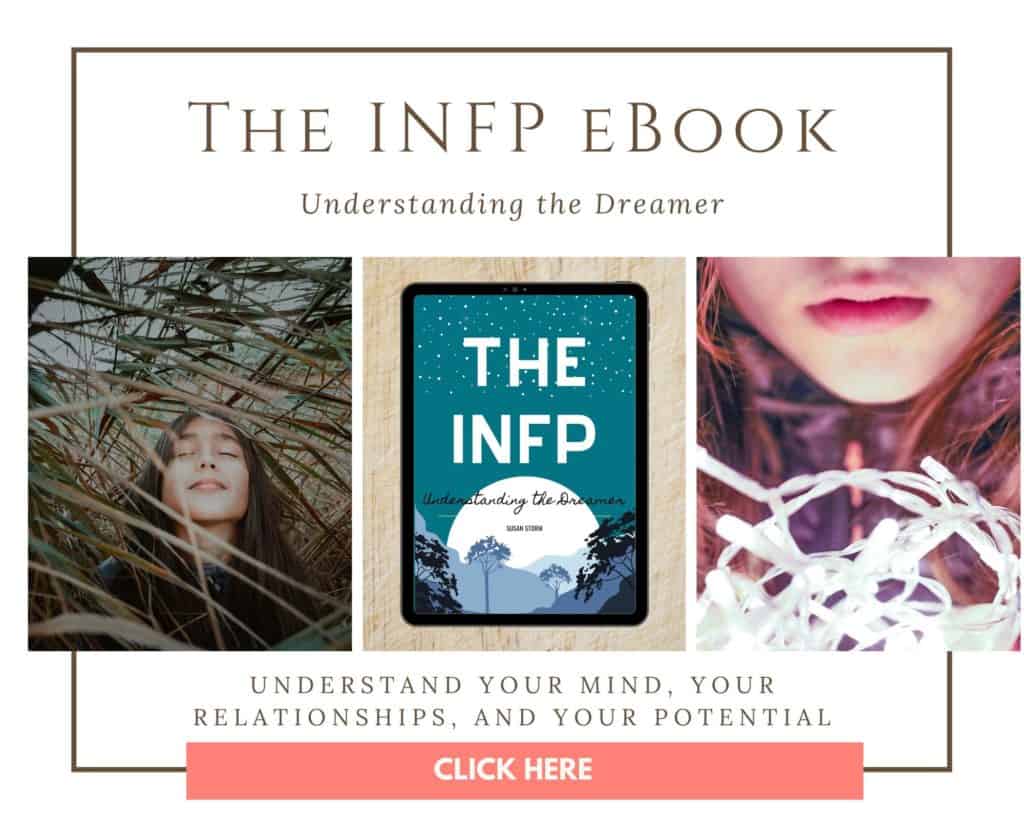
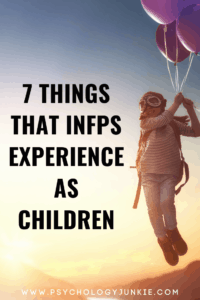
Subscribe to Our Newsletter

Want to discover more about personality type? Get the inside scoop with Susan Storm on all things typological, along with special subscriber freebies, and discounts on new eBooks and courses! Join our newsletter today!





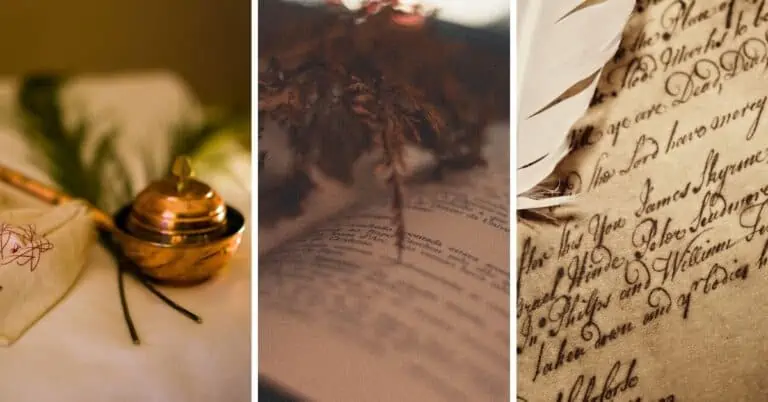
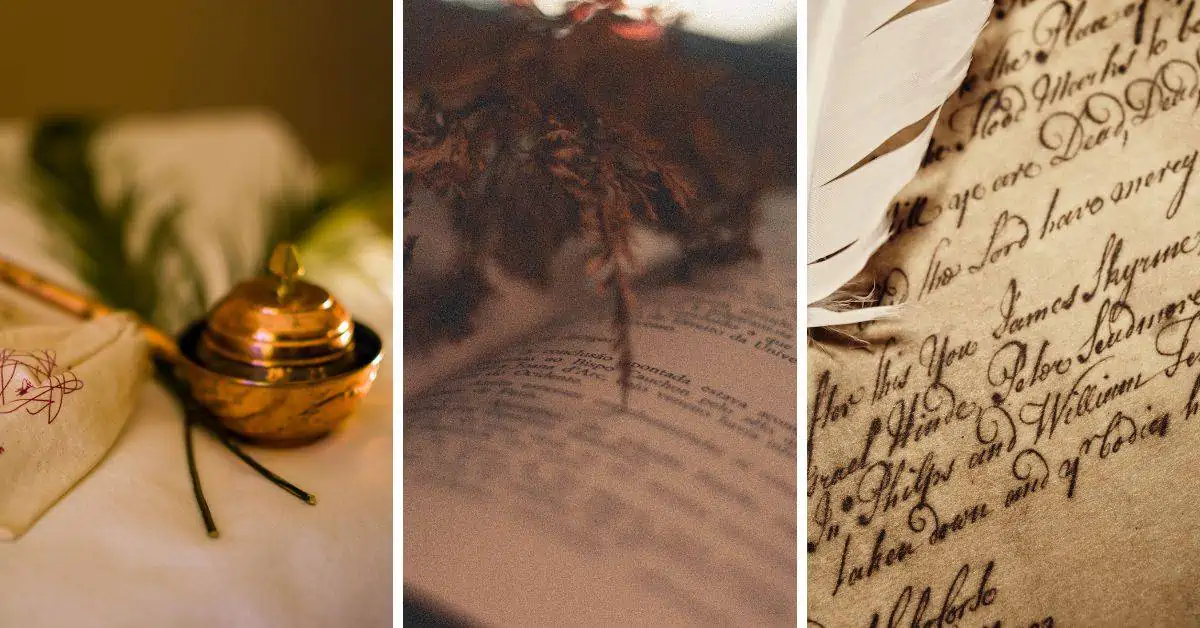
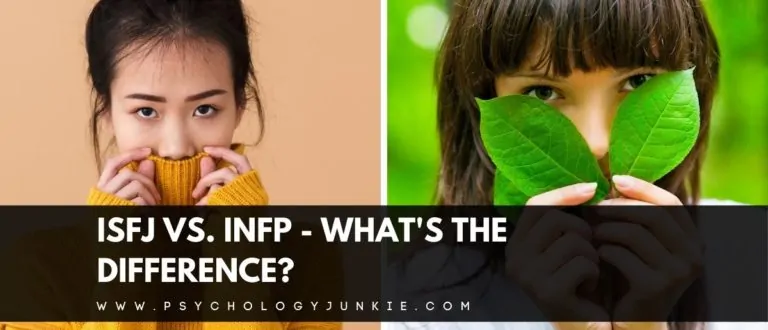
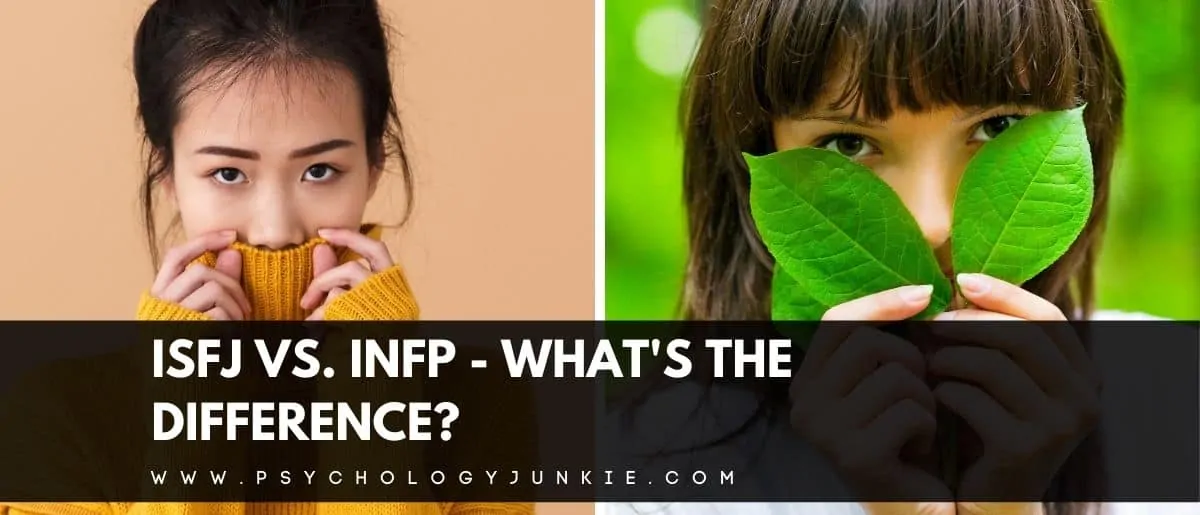


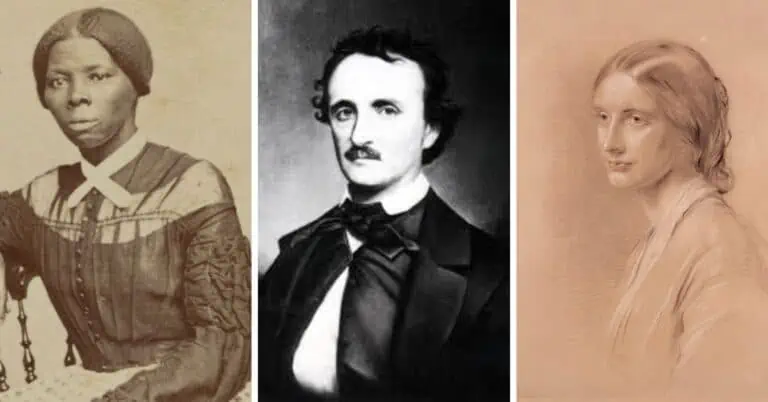
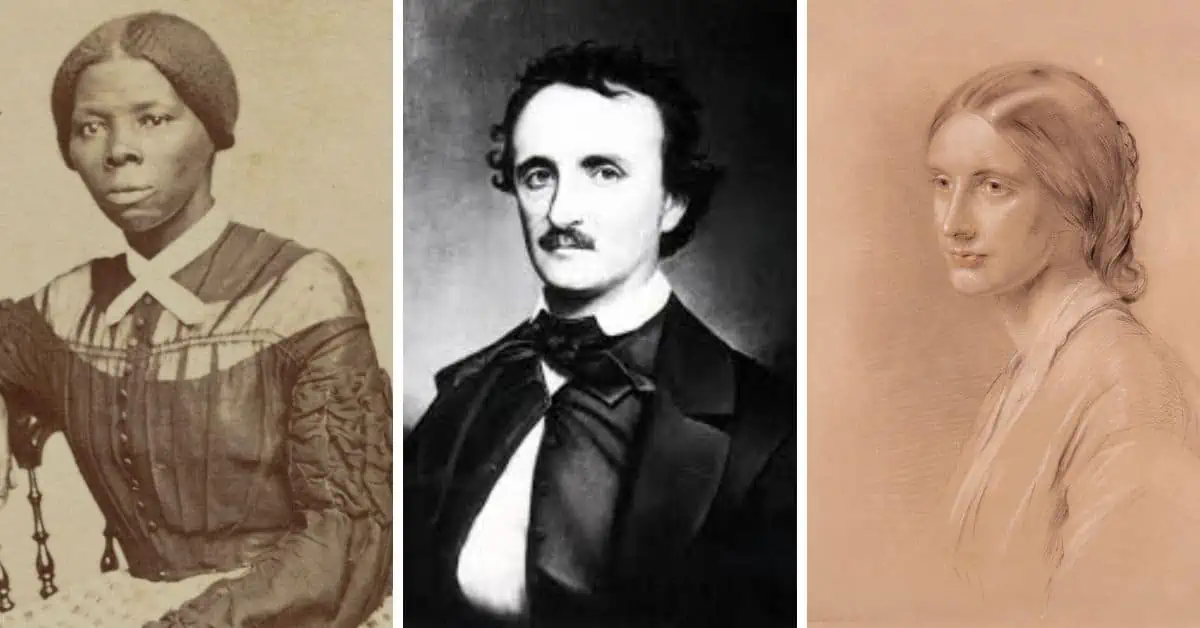
That was so accurate and that’s why I always daydream about the future and any possibilities and also even if I was a clever student I always struggle to concentrate to what the teacher says and get into my train of thought, I also find relation in every thing even if they are different, I also understand people and be around and stand up for the weird one the weak one the forgotten the troubled one and the broken one . even if I always try to understand people and see things in their prespective I have never been understood even if I always lend an ear for a friend who is sad I never felt comfortable talking about mine and knowing that I’m not alone is giving me a chance to accept my self and love my self. I send my love and appreciation for the INFP’s all around the world
I’m an infp and These are the reasons I felt misunderstood many times but I could never speak them. Sometimes I felt I’m a wrong person from the way my mother treated me. Thank to you it all make sense now.
To be honest, as a child, I was very happy, and had lots of friends, and when my 10th birthday rolled around, I went to a different school after my friends and I had a falling out. Then everything changed. I don’t see myself as an INFP as a child, but extroverted, happy, and silly. It’s interesting to see how I’ve become the polar opposite of who I used to be.
As a child, I don’t think I was much of an INFP. I was extroverted, had a lot of friends, and happy. Then my 10th birthday rolled around, my friends and I had a falling out, and I went to another school. I was changed. Now, I am the complete polar opposite of who I was. I am reserved, for one, but I still care about winning things, doing extroverted things, and wanting friends, yet I’m still an INFP apparently. Each time I took the test, it was INFP. And I still don’t know how. It’s like I have two worlds jumbled inside of me. One was leaving, yet a part of it stuck around. And now the second world is stuck, and they’re trapped together.
It was very accurate about me too. My family never understood me and always laughed about my feelings toward lost animals and people. Even though I was an excellent student I was lonely, because I was always learning what I wanted. Philosophy, art, genealogy, jazz for example at early childhood? Who with was I able to talk about these? Nobody. Even until today I barely meet with people who with I can talk. I stayed the misunderstood child.
oh by was that hitting a home run..As a child I had a mother who was difficult and a father who let her dominate..Only one person understood my personality and intelligence and that was my principal who had known me for 13 years..One of my lecturers called me a polymath and this has been proven ..I prefer to lift people up so they can see the possibilities and it has taken my husband a long time to see the real me.I have 2 sons like myself and a grandson the same it helps that we can sound each other out
My parents especially my mother never understood me as a child. I have a sister who is very demanding emotionally and I got lost in the shuffle a lot. I’d cry over the of attention from my family because my sister needed it more. I was sad a lot as a kid and it translated into me being less than myself as an young adult. A failed marriage and I’ve realized it’s not me.
This is so accurate, that it almost hurts… I’m finally accepting the fact that I have social anxiety, and it seems to link back to my middle school years of what I guess you could say was verbal bullying. I was the “quiet girl”, and people didn’t like me for every little reason possible. Some of their words & all of those feelings they made me feel have stuck to me, and it’s been about what, eight years? Resonated with everything, but that especially caught my attention.